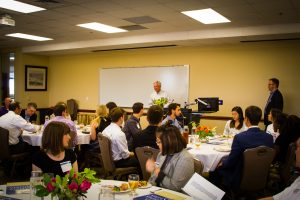by M. C. Jennings | May 10, 2018 | Academics, COBA Events, COBA Faculty, COBA Staff, College Decisions, Current Students, Faith Infusion, Outcomes, Social Entrepreneurship, Uncategorized
Graduation is only a few days away and it’s the time of year we sadly say goodbye to our graduating seniors. We are proud of our students and we’d like to introduce you to a few of them on this blog, letting you know how their time at ACU has molded them, where they are headed after graduation, and what advice they have for the new freshmen class coming in the fall.
Allie Cawyer, Marketing major from Plano, Texas
After graduation, I will be moving back to Dallas and hoping to work in the corporate event industry.
For the last year, I have been working with University Events here at ACU and it has only made me more excited to pursue events full time. So, getting to actually do events all the time and working in that position is making me excited for graduation. Plus, no event is the same so I will not have to worry about doing the same thing every day.
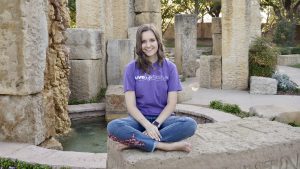
Allie Cawyer
My favorite ACU memory was probably when I studied abroad two summers ago. The experience was unlike any other and I not only learned about all of the other cultures but also about myself.
My favorite class was Leadership Summit because I got credit for taking a class in the mountains of Colorado, but the takeaway was much more than just the credit hours. So many people poured into us during that week with life lessons, truth and God’s word that nothing can compare to it.
My advice would be to be as involved as you can within your department, no matter what it may be. Get to know not only your classmates but also your professors because they truly care about you and your life. Start it early on, so that you get the full experience all four years.
Steven Yang, English major and COBA Student Worker from Chiang Rai, Thailand
After graduation, I am going to Regent University of Law in Virginia Beach, Virginia. I am excited to be done with my undergrad and be able to travel home and see my family in Thailand.
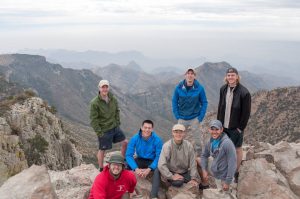
Steven (tan jacket in the middle) and friends hiking over Spring Break.
My favorite memory at ACU is climbing different buildings, having game nights, and biking around Abilene.
My favorite class was Literature for Young Adults because reading stories from this class connects me to my past and helps me find my identity.
I would tell incoming freshmen to work hard
but never lose the ability to see the silver-lining in life. Life is too short and too hard to not be happy.
Katie Isham, Accounting major from Decatur, Texas
After graduation, I plan to work at PwC in Dallas as an Audit Associate. I’m most excited to go out and use the skills and knowledge I’ve learned throughout college to bless others. I’m not sure what that will look like, but I know that God has big plans- I’m just glad to be a part of them!
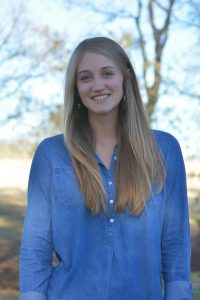
Katie Isham
My favorite ACU memory…. hmmm. There’s not a certain memory that sticks out to me, rather my favorite thing about ACU is the people. Finding and creating friendships with diverse people who have the same aim, to love the Lord by loving others, has been instrumental in making me who I am.
My advice to incoming freshmen is don’t be afraid to step outside of your comfort zone. You’ll regret the opportunities you didn’t take and the friends you didn’t make. Keep your relationship with the Lord your main priority and join a church and Bible study right away! Regardless of what happens in your next four years, know that God so loved you that he sent his son to die for you as an atonement for your sins, so that through GRACE you are saved, not by your own works. Give all the glory to God!
Jack Oduro, Accounting major from Garland, Texas
After graduation, I am going to take a missional focused trip to Ghana for
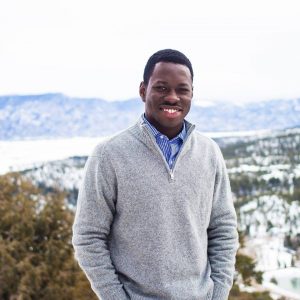
Jack Oduro
the summer. Then, I begin getting ready for my full time job with Weaver & Tidwell LLP in Dallas. I am excited about graduation and grateful that all of my family is in one place for the first time in two years.
My favorite ACU memory is…truly, any time I got to spend time with the people at this school was inspiring. Some of my best moments may include late night strolls around campus and potential trespassing with life-long friends, friendships which began here.
My favorite classes were Social Entrepreneurship with Laura Philips and Leadership Summit with the Lytle Center for Faith and Leadership. They are both up there in the extraordinary classes category. They both live up to ACU’s commitment of creating leaders for Christian service around the world.
My advice for the fishy is to seek to genuinely serve others because big changes start with the little acts of service.
Congratulations to the class of 2018! As Minor Meyers said, “Go into the world and do well. But more importantly, go into the world and do good.”
by M. C. Jennings | May 7, 2018 | Academics, COBA Events, Current Students, Uncategorized
Each year, COBA inducts new members into the ACU Chapter of Beta Gamma Sigma, the international honor society serving business programs accredited by AACSB International (the Association to Advance Collegiate Schools of Business). Membership in BGS is the highest recognition a business student can receive in an AACSB accredited business program and a student must be in the top 10% in order to be asked to join the organization.

Last month, at a luncheon in their honor, COBA welcomed 34 new members to the chapter. Current BGS officers and faculty encouraged the new members to continue to learn and lead with integrity, honor, and commitment to excellence and asked them to be active participating members in the ACU Chapter, helping to further advance the mission of the College of Business Administration.
Dr. Andy Little, Associate Dean for COBA, said, “Beta Gamma Sigma is COBA’s academic honors society for business majors. It is an important recognition for these students, because it is an invitation-only organization, and membership signifies hard work, dedication, intelligence, and commitment. Within the organization, at ACU we emphasize honor, wisdom, and earnestness. The students complete service projects during the year, as well as other activities.”
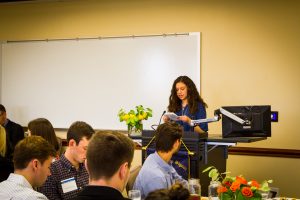
Membership in Beta Gamma Sigma provides many benefits, including educational and professional opportunities to support members on campus and throughout their professional lives. Click here to learn more about Beta Gamma Sigma. Congratulations to our newest BGS members!
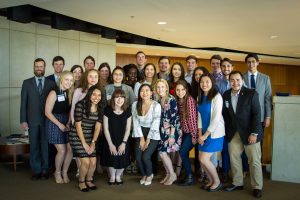
2018 Beta Gamma Sigma Inductees are:
Luke Anthony
Kasey Birchfield
Noah Brinegar
Shannon Buergner
Ivria Bunner
Adam Chambers
William Clevenger
Nicholas Cromwell
Slade Downs
Jennifer Estrada
Alexander Faure
Jack Gibbens
Nathan Harrell
Kennedy Jones
Meagan Kurosky
Devanie Lail
Taylor Langlais
Jolene Liow
Eden Lopez
Karla Mendoza
Kristy Ng
Emily Padgett
Emily Parisi
Lessly Rocha
Daniel Seibert
Nathan Sherrill
Taryn Smith
Allison Sorrells
Luke Stevens
Allen Storm
Daniel Vensel
Jemaimah Wavamunno
Janely Williams
Connor Wilson
by M. C. Jennings | May 4, 2018 | Academics, Accounting, COBA Faculty, Current Students, Faith Infusion, MAcc, Uncategorized
COBA honored the MAcc (Master of Accountancy) class of 2018 at a luncheon on Thursday, May 3rd that was sponsored by KPMG. Special guest speaker was Cliff Crockett (’89), Partner at KPMG and father of graduating MAcc student, Daniel Crockett.

Cliff Crockett
Mr. Crockett gave the students 10 tips for success as they begin their careers.
- Character and integrity count. Be trustworthy and admit your mistakes. “Blessed is the one who does not walk in step with the wicked or stand in the way that sinners take or sit in the company of mockers, but whose delight is in the law of the Lord, and who meditates on his law day and night. That person is like a tree planted by streams of water, which yields its fruit in season
and whose leaf does not wither—whatever they do prospers.” Psalm 1:1-3
- Establish goals and learn to manage yourself and your career. Begin with the end in mind and ask yourself where do you want to be in 5 or 10 years? Reassess your goals at different points along the way. Invest in and work to continually improve yourself. Root your goals in prayer and God. “Commit to the Lord whatever you do, and he will establish your plans.”Proverbs 16:3
- Find a mentor(s) inside and outside of your employer, preferably someone older who can give you different perspectives. As you grow older, find someone you can mentor.
- What are your priorities in life going to be? Your priorities reflect where you spend your time.
- Be a lifelong learner. Always seek to learn something new. Continue to learn and cultivate your relationship with God.
- Be a servant leader. Put others first and be an encourager. Be salt and light in the world.
- Remember where you came from. Remember your roots – especially ACU. Stay connected to and be proud of being an ACU graduate. Remember the investment others have poured into you and pay it forward to the next generation of students that come through ACU.
- Stay involved with your church and community.
- Remember to give back. Give of your time and talents, not just your money. Make giving back the first thing you do – be intentional about it. Remember who your money belongs to.
- Keep your eyes on Jesus. Everything falls in to place if you keep your eyes on Jesus. “Therefore, since we are surrounded by such a great cloud of witnesses, let us throw off everything that hinders and the sin that so easily entangles. And let us run with perseverance the race marked out for us, fixing our eyes on Jesus, the pioneer and perfecter of faith. For the joy set before him he endured the cross, scorning its shame, and sat down at the right hand of the throne of God.” Hebrews 12:1-2

Kaitlyn Renner Allen and Dr. John Neill
Dr. John Neill presented the Outstanding MAcc Graduate of the Year award to Kaitlyn Renner Allen. As an undergraduate student, Kaitlyn majored in Accounting while maintaining a perfect 4.0 GPA throughout the undergraduate and graduate accounting programs. She was President of Beta Gamma Sigma Business Honors Society; a member of Phi Eta Sigma Academic Honor Society; and a member of GATA Women’s ACU Social Club. She has received the following honors: Dean’s Honor List; R.L. Money Chancellors Award; Valedictorian Scholarship, Accounting Education Foundation of the Texas Society of CPAs scholarship, and the Abilene Chapter of the Texas Society of CPAs award. Last spring, she had the opportunity to intern with PwC in Dallas and she has accepted a full-time position as a Tax Staff Accountant in the Ft. Worth office starting this July.

Dr. Scott Stovall reads his blessing over the graduates
Dr. Scott Stovall gave this blessing over the graduates:
We accounting and finance faculty offer you our blessing. It has been an honor to teach and serve you. Your spirit, your curiosity, and your servant heart have lifted us up while you have been here. Your attitude has amazed us and perhaps a few times disappointed us. As you prepare to leave us, we ask that you remember a few things.
First, remember that God is Sovereign over everyone and everything. As one of His children, your sole purpose on this earth is to glorify Him. As you begin your career, remember to be the best professional that you can be. God has called you to do everything as though you are doing it for Him. Should you choose to marry someone and raise children, ground those relationships in God’s love. Follow the advice that my grandfather once gave me and choose a mate who will help you, and who you can help, get to Heaven. Show your children (and your grandchildren) what God is like.
Second, remember to take great care about wealth and money. Don’t live beyond your means. God will bless some of you with the talent to make money, and we hope that you in turn bless God’s Kingdom with that talent. On the other hand, there may be no greater threat to your spirituality than to become entangled by pursuing wealth and things. Jesus likened riches to weeds that can choke out the Word of God. Using Paul’s words to Timothy, remember that, “…godliness with contentment is great gain.”
Third, remember that Jesus is your salvation. You will fail many times over your lifetime. Remember that in Christ, failure is victory. You will glorify God if you remain in His grace. There is no failure, mistake, or sin from which Christ is unable to redeem you. God is always, ALWAYS waiting on you.
Finally, remember that we faculty, your COBA family and your Christian brothers and sisters love you. Hold each other accountable. Be transparent with weakness. Show strength by reaching out to others for help. Although you are graduating, treat us as a “city of refuge” to which you will travel to share both joy and sorrow. Be good stewards of the reputation you now have as MACC program graduates.
With paraphrased words of our Savior from many years ago, Dear Father:Bless us to be poor in spirit, for ours is the kingdom of heaven. Bless us to be mournful, for we will be comforted. Bless us to be meek, for we will inherit the earth. Bless us to hunger and thirst for righteousness, for we will be filled. Bless us to be merciful, for we will be shown mercy. Bless us to be pure in heart, for we will see God. Bless us to be peacemakers, for we will be called sons (and daughters) of God. Bless us as we are persecuted because of righteousness, ours is the kingdom of heaven. Amen.

The MAcc Class of 2018
Graduates, your adventure begins now. Congratulations to the Master of Accountancy graduating class of 2018!
To download and/or order prints of pictures from the luncheon, click here.
by M. C. Jennings | Apr 4, 2018 | Academics, COBA Events, Current Students, Faith Infusion, Student Spotlights, Uncategorized
COBA donors, scholarship recipients, Dean’s Council, and faculty and staff gathered on Thursday, March 22nd, at the annual Ruth Allen Griggs Scholarship Luncheon. The luncheon, inspired by the memory of the hospitable Ruth Allen Griggs, seeks to honor the spirit of generosity and to encourage others to give back. Each table was buzzing with discussion as students, donors, and faculty members conversed about their experiences at ACU and why giving is so important.
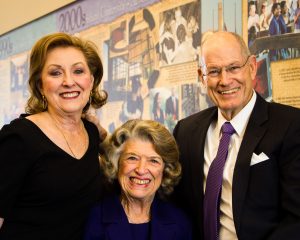
Ann Griggs, Ann Berger Griggs, and Jack Griggs
Students Anna Hornell, junior management major from Fort Worth, TX, and Darius Bell, senior computer science major from Frisco, TX, represented students who have received COBA scholarships, speaking to the audience about what receiving those scholarships has meant to them and the impact that it has had on their education and experiences at ACU.
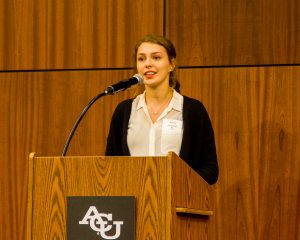
Anna Hornell, junior management major from Fort Worth, TX
Anna said, “The Ruth Allen Griggs Luncheon was such an amazing opportunity for students and donors to meet! It was a time for students to express gratitude to those who allowed them enriching and even life- changing opportunities and to be inspired to generosity both now and in the future. I am hopeful that donors enjoyed connecting with students and hearing about the experiences that they have blessed them with.”
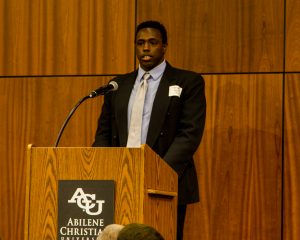
Darius Bell, senior computer science major from Frisco, TX
Darius said, “Giving back creates a thread that binds us all together. Although it is not always easy or convenient, it gives birth to community, community gives birth to a culture, and a culture gives birth to a lasting hope. Receiving this scholarship from the College of Business Administration revealed to me that ACU’s mission and vision extends past the plaques the name is written on and actually lives within the hearts and lives of the donors.”
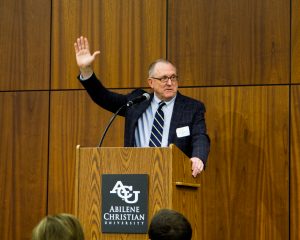
Gary Skidmore, guest speaker, talks about the importance of giving
Gary Skidmore, Chairman of Aberdeen, member of the COBA Dean’s Council, and former ACU Board Trustee spoke to the crowd, relaying a story Dr. Condoleezza Rice tells about her grandfather. “She said that when her grandfather went to college, he paid for his first year in cotton. His sophomore year, he was asked how he would pay for school and he said, ‘I am out of cotton,’ so they said, ‘You are out of luck.’ He asked how the other boys were going to pay. They said, ‘They have what is called a scholarship and if you wanted to be a Presbyterian minister, you could have a scholarship, too.’ My grandfather said, ‘That is exactly what I had in mind.’ Dr. Rice stated that ‘My family has been Presbyterian and college educated ever since. That access to education changed everything. Not just for him, but for generations to come.” Skidmore noted that because of her family’s legacy of education, Condoleezza Rice has gone on to become both a Professor and Provost at Stanford University, National Security Advisor, and Secretary of State. He went on to say, “We’ve all likely received some sort of scholarship” citing statistics that 75% of all college students receive some sort of financial aid and that scholarships are one way we model what Jesus taught us as Christians – to help others. He stated, “We don’t know what will happen if someone is enabled to attend ACU…how their life will be changed. I know I don’t want to learn someday, if only someone had given, cancer would have been cured. In giving, both the giver and the receiver benefit.”
Dean Brad Crisp summed the event up by saying, “The Griggs Luncheon is a favorite event of mine because of the way it reflects and underscores our values. As COBA updates our guiding statements to describe our deeply held values, we are emphasizing how our Christian faith leads us to gratitude and generosity. This event allows our students to express their gratitude for the generosity of our donors.”
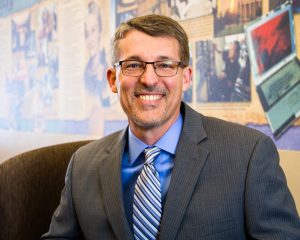
Dr. Brad Crisp
by M. C. Jennings | Sep 6, 2017 | Academics, Careers In..., COBA Staff, Current Students, MAcc, Outcomes, Placement stories, Uncategorized
Aimee Agee is COBA’s Professional Development Manager for Business and Technology students. She works continuously with students to equip them with the skills and knowledge to successfully launch into the professional world. This includes meeting one-on-one with students to discuss their job and internship opportunities and outcomes, connecting them with employers who fit their skills and needs, and analyzing data on each student graduating while remaining in contact with them in their post-grad life. Aimee also conducts class insertions where she discusses specific careers with employers as well as more general information about interviews, resumes, networking, and more. Agee supplied the coaching and leadership needed to help COBA’s business and technology students improve their outcomes this year. Her hard work and excellence in developing and communicating with students has impacted COBA graduates’ academic and professional careers positively.

Aimee Agee
We are pleased to announce that the B.B.A. programs’ overall outcomes have moved beyond our stated goal of 90%. 93% of our May graduating class received either a job offer or an acceptance into a graduate program within ninety days of graduation. Achieving this rate gives us a past-four-year average of 90.18 %. The average starting salary for our B.B.A. students was $41,497. The School of Information and Technology had a very strong bump in employment, especially from Digital Entertainment Technology graduates. SITC had a 100% outcome rate of students with a job offer or acceptance to a graduate program. This includes their international students and again exceeds the target of 90%. The average starting salary for SITC graduates was $57,600. COBA saw 100% of the students in the Master of Accountancy program employed within ninety days of graduation. The average starting salary for MAcc graduates was $55,000.
Learn more about COBA’s Professional Development Program for current students and alumni at the links listed or by going to www.acu.edu/coba.
by M. C. Jennings | Sep 5, 2017 | Academics, COBA Faculty, Current Students, School of Information Technology and Computing, Uncategorized

Rich Tanner
COBA would like to welcome Rich Tanner, new Clinical Professor of Digital Entertainment. Rich has taught for the School of Information Technology and Computing part-time for the past several years and will now be working with technology students on a full-time basis. Tanner has an A.A.S. in Computer Graphics and Programming from Missouri State University, a B.S. in Information Technology with a Concentration in Graphics and Game Development from Abilene Christian University, and a M.S. in Human Computer Interaction from Iowa State University. Rich was contracted as an iOS Developer and Consultant for the KAART Group, was contracted to develop a number of mobile applications for ACU, and worked as a Mobile and Senior Software Developer for USAA. Tanner teaches 3D Modeling, Animation, Mobile Application Development, Game Asset Creation and Texturing, and Character Creation in Maya, Photoshop, and Unity. Tanner brings skills and ingenuity to his classes that will instruct and develop technology students in new and exciting ways.
What do you teach at ACU?
The cool stuff! As a DET faculty, I get to teach 3D Modeling, Animation, and Mobile Application Development (a CS course).
What committees/other duties do you have at ACU aside from teaching?
I have been assigned as a Developer Mentor for Wildcat Software, our student run software company.
What drew you to teaching? Why did you want to work with students?
It’s what I do! Even at USAA, I often found myself drawn to roles where I could teach and mentor new employees and interns. My wife and I also spent 3 years as Youth Ministers while we were in Plano, and I’ve been practicing my teaching on my own children for the past 19+ years. I love seeing people get excited about new ideas and material, and helping people realize their potential. Plus, I just generally get excited about the kinds of things that I get to teach! It’s only natural to share that excitement with a room full of people.
Outside of teaching, what passions and hobbies do you have?
Obviously, I enjoy spending time with my family. My wife and I have been married for almost 21 years, and we have four children. Richelle, who is 19, is a new transfer student to ACU, studying Elementary Education. Kira is 15 and goes to Abilene High. Xandra is 12 and is a student at Craig Middle School. And Connor, who is 7, goes to Bonham Elementary. Connor is the only boy, and was born here in Abilene right before I graduated from ACU. We all enjoy watching lots of movies together and playing various games. I spend my free time (when I have any) working on home renovations, playing video games (usually single player adventures), and doing lots and lots of reading.
by M. C. Jennings | Aug 2, 2017 | Academics, Careers In..., Current Students, Student Spotlights, Student Spotlights, Uncategorized
Brandon Gonzales is a senior Accounting major from Rowlett, Texas. He is interning with Concho Resources this summer.
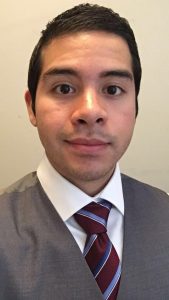
Brandon Gonzales
Q: What have you done in your internship so far?
I am currently interning at Concho Resources which is an oil and gas E&P company based in Midland, Texas. As an accounting intern, I was placed in the revenue department where I was assigned a summer project that I worked on throughout the internship. My project was to perform a self-audit of the severance taxes for oil and gas that Concho paid for its New Mexico wells. If you intern at Concho, you will be assigned a major project associated with the department you are placed in at the start of the summer. At the conclusion of the internship, you will lead a presentation over the results of your project to the upper-management of the company. Due to its importance, my first month of the summer was solely dedicated to working closely with my mentor on this project. This is because each project is over an issue that Concho has an interest in and a majority of the work done by the interns are put to use by the company. For example, the workbook that I created for my project can be directly adapted for future use by the revenue department in performing audits for years outside of the scope I was assigned. After the first month, I was rotated for the remainder of the summer among other departments and groups so I could get more exposure to accounting in the company. I moved to another floor and started working alongside the Director of Accounting and a senior accountant where I helped analyze reserve reports that we received over our properties. My main job on that project was to identify and represent key information that they wanted to review in a future meeting. I created a number of pivot tables and other charts compiled from the data in reports. After a few days, I was moved once again and began working in the Joint-Interest Billing department. There I performed another audit, but this time it was over joint operating agreements that we had from previous years. I was tasked with researching each agreement to determine if we were correctly paying what the contract stated by comparing what we had in our records. Currently, I am still in the JIB department, but am now working with another group to review unbilled properties and the accompanying invoices to determine if they are correctly billed in the revenue system we use.
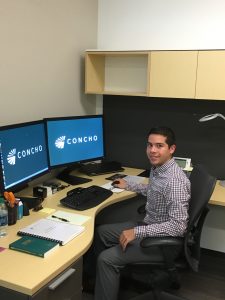
Q: What has been your favorite part of the internship?
My favorite part of the internship so far must be how involved Concho is in making sure the intern class is enjoying the summer in Midland. They want to be sure that we come away from this internship with positive memories of not only the company, but the city as well. There were multiple events throughout the summer that Concho orchestrated for the interns to get together and everything was always paid for by the company. From minor league baseball games in the company’s private box suite to golfing at the country club. They even sent us to Midland’s Petroleum Museum for a day of training so the interns could get a better sense of the oil and gas industry. The coolest event being a field trip out to one of the oil rigs where we received a personal tour from one of the supervisors. Concho also provided summer housing for the interns which really helped in bringing everyone together since we all literally lived doors down from each other. Even when there was not a company sponsored event, the interns usually had something planned like a cookout at the apartment pool.
Q: How do you see this experience aiding you in the future?
Going into this internship, I knew nothing about the oil and gas industry including how accounting was done for E&P companies. However, I was never given any busy work this summer. All the projects I worked on were assignments that would be given to the regular staff and provided an actual benefit to the company. Being treated as another new-hire was worthwhile and the knowledge that I gained can easily be leveraged in the future if I decide to pursue a career in the industry. Getting to know the people I worked with was one of the biggest benefits that I gained from this internship. I’ve built relationships with multiple people over the summer who gave me guidance not only in my career, but life as well. In particular, one coworker welcomed me into her church and got me connected with the youth group she ran. Even if I never work at Concho or in the oil and gas industry, building relationships with more experienced people in the field was a great experience.
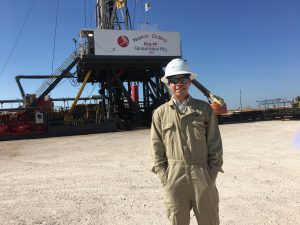
Q: What has grown you as an individual the most in this internship?
I’ve always been the type of person who likes to figure out solutions to problems I come across on my own. With this internship, I had to learn to be more proactive in asking for assistance from not only those who I worked directly with, but others within the company. I knew almost nothing whenever I started a new project and at times that was daunting. Repeatedly needing to ask for further explanations was something that I was uncomfortable with because I didn’t want to be a bother. Over time, I came to realize that being given more responsibilities didn’t mean that I had to bear everything alone. Looking around the office, I noticed that it was common to see people collaborating on their work. Although people had separate responsibilities, we were all part of the same team. This environment helped me get used to working as a part of a larger team and not be afraid to ask for further clarification on what I was doing. People welcomed questions because they wanted to make sure I understood not only how something was done, but the why as well.
Q: Do you have any tips for others?
Audit or Tax? Big 4 or mid-tier firm? These are common questions that accounting majors come across at some point in undergrad. Some students find their own answer within weeks, while others are unsure up until graduation. However, when it comes to starting their career, I think that many accounting students are too quick to dismiss starting out their career in an industry role. Going into public accounting straight out of college is seen as the traditional route with securing a great job in industry after years of experience as the end goal. I think this is due in large part to the fact that many of the companies that recruit on campus are public firms. There is little exposure to any other option before graduation. This summer, many of the staff that I worked alongside did do not come from public backgrounds and I was curious as to why. I received various answers, but the most common was that the long-term goals they had for themselves were perfectly attainable without going into public accounting. The main takeaway being that both routes have their pros and cons so it is up to the individual to decide which path is best for them. I would encourage younger students to equally give both options their attention as they go through college. Choosing to dismiss one side without the proper due diligence is simply closing off a number of future opportunities.
by M. C. Jennings | Aug 1, 2017 | Academics, COBA Faculty, Current Students, Human Resource Management, MBA, Uncategorized
Dr. Brad Crisp announced last week that Dr. Phil Vardiman, Professor of Management, will begin serving as director of COBA’s online graduate business programs beginning August 1, 2017. Dr. Vardiman will have responsibility for the MBA and MS in Management (MSM) programs offered in collaboration with ACU-Dallas and will interface with other ACU-Dallas programs through their academic and leadership councils.
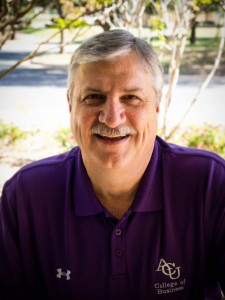
Dr. Phil Vardiman
Vardiman earned a Bachelor of Science from ACU in 1976, earned his MBA from the University of Mary Hardin-Baylor in 1992, and holds a Doctor of Philosophy from Texas A&M. Phil has a long history both in education and industry, having served as the Regional Human Resources Director for Cardinal Health from 1997-2000, Human Resources Manager for Avery Dennison Corporation from 1986-1997, and Production Supervisor/Quality Analyst for General Tire & Rubber Company from 1977-1986. He has been heavily involved with human resources and entrepreneurship organizations in both educational and industry settings and has published numerous articles in academic journals as well as presenting papers at 16 academic conferences. Dr. Vardiman also actively consults for businesses, working with them in the areas of human resources, training, quality, safety, and leadership development. Vardiman has taught at ACU since 2002, with special teaching interests in Human Resource Management, Entrepreneurship, Management & Organizational Behavior, Leadership Development, Safety & Health, and Organizational Development. In addition to these teaching interests, he has been active in leading students on COBA Study Abroad trips, traveling to Australia, China, Honduras, and Oxford as well as working with numerous university service activities, advising and club sponsored activities. Known to his students for his “Conceptual Truths” and enthusiasm, to say that Phil Vardiman has a passion for helping others grow and succeed would be an understatement.
When talking about his new appointment, Dr. Vardiman says that he is excited about serving on the COBA and ACU-Dallas Leadership Teams and for the opportunity to understand ACU-Dallas better. While serving as ACU Faculty Senate Chair, one goal of his had been to help ACU faculty become more familiar with ACU-Dallas and to build relationships between the ACU on-campus faculty and the ACU online faculty. When asked what his priorities will be while serving as the Director of the COBA online graduate programs, Vardiman said that he will look at faculty, possible changes or additions to course curriculum, and increasing student enrollment. He anticipates looking at the MBA concentrations to affirm what is working and what can be developed to increase offerings to online graduate students, stating that at this time, there is no intention to add concentrations but there may be additions in the future.
Dr. Vardiman said that he is most excited about the learning opportunity that this new position will require. His desire is to have a rigorous and solid MBA that is well respected and he is excited to play a part in making that happen. Should current undergraduate students fear they won’t have the opportunity to have him as a professor, don’t worry – he will still be teaching his favorite class MGMT 330 in the fall along with International Business while in the spring he will teach his Safety, Health and Security class. Vardiman said that he was adamant that if he accepted this new positon, that he be allowed to continue to keep teaching undergraduates, stating, “If I lost that, it wouldn’t be worth it.” Teaching is his passion and helping ACU grow into the future is the catalyst for deciding to enter into this administrative role.
Dr. Brad Crisp stated his support by saying, “Phil is an excellent teacher and mentor, and he recently completed a term in leadership of ACU’s Faculty Senate. Joey Cope, Stephen Johnson, and I are all excited about what Phil will bring to this role to support the growth and quality of our MBA and MSM program.” Congratulations to Dr. Phil Vardiman on his appointment as Director of COBA’s Online Graduate Business Programs.
by M. C. Jennings | Jul 24, 2017 | Academics, Current Students, Faith Infusion, Student Spotlights, Uncategorized
McKinley Terry is a senior Management major with minors in English and History from Longview, Texas. He is interning at Alpine Church of Christ in Longview, TX as the youth ministry summer intern.
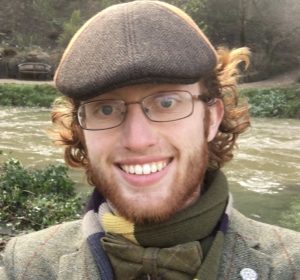
McKinley Terry
Q: What have you done in your internship so far?
So far, I have helped lead classes for middle schoolers and high schoolers in our youth group, organized mission trips and social events, and helped our students better serve others throughout their community and the state of Texas.
Q: What has been your favorite part of the internship?
My favorite part was definitely our recent mission trip to Camp of the Hills in Marble Falls, Texas. We served nearly four thousand meals that week to campers brought in by faith and community-oriented groups throughout Texas. I always loved going on this mission trip when I was in the youth group, so it was incredible to get to serve again as a leader and motivate our students to serve others.

Q: How do you see this experience aiding you in the future?
My goal is to eventually teach at the university level, so working with young adults has helped me to understand the difficulties and opportunities in reaching and mentoring them.
Q: What has grown you as an individual the most in this internship?
I have seen first-hand the difficulties that non-profits such as churches face regarding operations, budgeting, and management. Having to balance the interests and management styles of separate individuals has helped me learn how to navigate what can often be chaotic situations without growing too frustrated and inefficient.
by M. C. Jennings | Jul 12, 2017 | Academics, Careers In..., Current Students, Student Spotlights, Student Spotlights, Uncategorized
Leah Montgomery is a senior Marketing/Management double major from Abilene, Texas. This summer, Leah is interning with PFSweb.
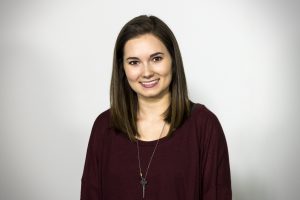
Leah has a marketing internship this summer with PFSweb, a leading global eCommerce solutions provider.
Q: What have you done in your internship so far?
A: The main two tasks I have been working on so far are the planning of a company event and writing a blog. Along with this I help the marketing team with any projects they are working on.
Q: What has been your favorite part of the internship?
A: I’ve really enjoyed seeing the process different projects have to go through before completion. Many events and publications seem very simple from the outside but on the creation side the complexity is impressive. By watching how a team can work together to get a job done shows how important every detail is.
Q: How do you see this experience aiding you in the future?
A: This internship has shown me how important group projects are. I know, everyone dislikes group projects but that is what we should expect after we graduate: never ending group projects. They are obviously different than in classes but the aspect of working as a team to achieve the same goal is the same.
Q: What has grown you as an individual the most in this internship?
A: Writing the blog has been the most challenging. I have never written a blog before, and haven’t needed to write a paper in college for over a year. Trying to make a topic in eCommerce exciting and worth reading was difficult. The original draft looks nothing like what is published, but with the help of a team of great writers I was able to get advice and edits that helped me understand more of what was expected and how I can improve and do better next time.
Q: Do you have any tips for others?
A: If Jennifer Golden ever teaches digital marketing ever again TAKE IT. That is the most obvious example of a class that I could pull information from directly and place it into my internship. Even as simple as knowing terms and understanding more about eCommerce so I could join conversations and understand what was being discussed. By knowing the information taught in that class I had more confidence going into my internship and feeling more prepared. Great class.
Check out Leah’s blog post for PFSweb here.








